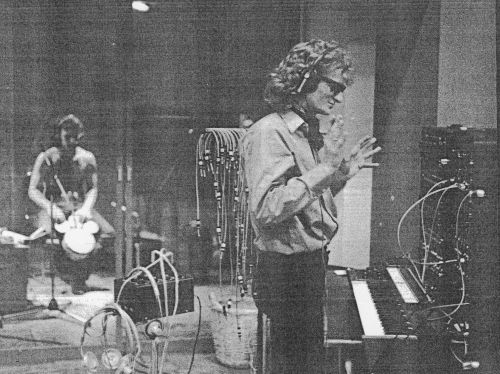In 2007 I had a short correspondance with Klaus Wiese. He was involved on the albums ‘Hosianna Mantra’ (1973) and ‘Seligpreisung’(1974). Here some quotes:
Klaus Wiese: To say it shortly, the phenomenon ‘Popol Vuh’ was only Florian Fricke himself. What he wanted to be played was exercised mostly by Conny and Daniel, who were the only ‘members’ of ‘Popol Vuh’. The others, including me, were temporary ‘guests’, like Holger Trültzsch on ‘Affenstunde’, and Bob Eliscu (oboe) on ‘In the Garden of Pharaohs’.
Dolf Mulder: How did you get into contact with Popol Vuh?
Klaus Wiese: I met Florian in the early seventies and he asked me to get a folding tambura from the music-shop of FAZAL INNAYAT KHAN in London, where I worked temporarily in these days.
Later on I played this tambura on some (invisible) tracks in an endless recording session in a church in eastern Bavaria near Peterskirchen, where Florian had temporarily a studio in a old castle, owned by the Duchess of Lehndorf.
Klaus Wiese: Florian, as a typical ‘pisces’ was very much addicted to 5-liter bottles of white wine, big Lebanon-joints for practical inspiration - and a medieval christian background of all kinds of inner experiences and visions.
Additionally he had some interest for Hinduism with all its ‘gods’ and ‘goddesses’, as it was quite common these days. Later on he made a year long overland trip to Nepal.
All music came out of his inner ‘vision’ and formed itself in many, many rehearsals - sometimes (10- times in one afternoon) - until the final ‘form’ was found .
Klaus Wiese: The disc I liked most from ‘Popol Vuh’ is an untypical one: ‘Affenstunde’ and second ‘Hosianna Mantra’. I see ‘Affenstunde’ as a neutral pace-maker for a form of ambient-music, that came later into existence.
Dolf Mulder: What made you leave the band?
Klaus Wiese: As I explained, I never ‘left’ the group as I never ‘joined’ any form of group. I kept in touch with Florian over the years until about 5 years before his death.
Dolf Mulder: How do you judge their importance from the present? Or, what do you percieve as the relevance of this group?
Klaus Wiese: Today I see Florian as a solitary pioneer of this age (60-s, 70-s). He was a visionary and his music is still ‘alive’ and beyond all pseudo-esoteric bullshit ( a term Florian used), like for example from Georg Deuter. They of course met in the small scene of music these days, consisting also of Peter Michael Hamel, Al Gromer and some other - lesser known - artists).
He was authentic in his form-principles of his music and never interested in cheap compromises of wordly gain.
He was always short of money in the typical artist-cliché, borrowing here and there, to make his ‘work’ go. Beyond wine and joints, he was always crystal clear (directed to the DIVINE, how he ‘saw’ it. On the piano there was always the old testament lying and he read there quite often, before he started playing.
We had quite often lenghty discussions about so-called ‘christian’ and ‘old-testamentical’ differences in accepting gods guide-lines. This happened only with me as I was not one of the musicians but had another background and my interest in music was not music ....
Dolf Mulder: Could you specify what in your experience makes up the religious quality of the music of Popol Vuh?
Klaus Wiese: The vibration-level of an old soul, that Florian was. It automatically actualizes in the ‘music’.
 Die fortschrittlichste, ausgereifteste und vielleicht wichtigste deutsche Plattenproduktion will jedoch bis jetzt nich keine Plattenfirma veröffentlichen. Zu wenig expressiv, zu weit voraus, zu aleatorisch erscheint den bei Deutschlands etablierten Plattenfirmen angestellten
Die fortschrittlichste, ausgereifteste und vielleicht wichtigste deutsche Plattenproduktion will jedoch bis jetzt nich keine Plattenfirma veröffentlichen. Zu wenig expressiv, zu weit voraus, zu aleatorisch erscheint den bei Deutschlands etablierten Plattenfirmen angestellten